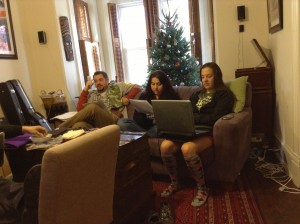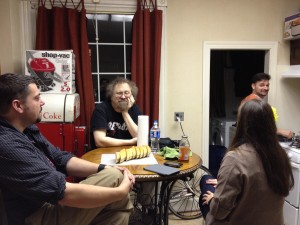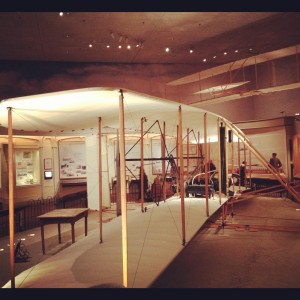A Writer’s Workshop
We held our 4th annual Writer’s Workshop that my husband and I host in our home. The players change a bit every year, but we’ve have some consistency as well. The original members at this point are me, my husband Ronald T. Garner and Aaron Allston. Bryan Young & Conley Lyons started joining us the 2nd year & have been permanent fixtures every year since. And my dear friend Maggie Allen joined us for the first time this year – additionally, it was her first workshop ever!
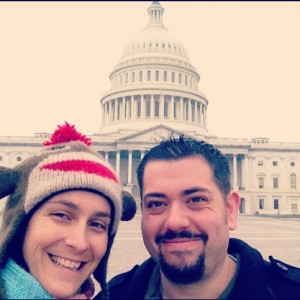
Me & Bryan on our way to the Air & Space museum – workshops aren’t just about tearing up each other’s stories. We have fun too!
This brings me to my first point, why are workshops important?
I was going to write this really insightful post about why all writers need to workshop their stories (even experienced Pro’s like Aaron), but I saw that Bryan beat me to it & did it far more eloquently than I ever could. His full post is here, but I’ll paste some highlights below. http://www.bryanyoungfiction.com/2012/12/the-importance-of-story-workshops.html
“Every year, we all submit between 7k and 10k words of prose and have the others hit us with both barrels of their notes. It’s an all day thing, with at least 5 or 6 people sharing stories and notes around the room. We all come having read all the submissions and we pick one victim…ahem…one writer at a time and we all discuss their piece at length.
And this discussion is frank. There is no pussy-footing around. Sure, we’ll briefly talk about what we liked about certain pieces, but the point of the workshop is to tell your fellows what doesn’t work in their fiction. We’re all friends and have been doing it for a while, so the need to sugarcoat problems is non-existent and we have frequent disagreements and arguments among each other. But it’s liberating.
This group of people, with totally different perspectives on issues as large as publishing, storytelling, and characterization, and as small as speech attribution tags, semi-colon use, and the font used, is so incredibly valuable to the process, it’s almost hard to explain.
Many writers want to show others their work and be pat on the head. And, when you’re dealing with an audience, you want to have crafted your work to a point where that’s the case. But no one can get their prose to that point on their own. Which is why unloading in sessions like these is so important. You’ve brought this piece of fiction that you’ve lost perspective on. You’re either suffering from a warrior mentality and think it’s the best work you’ve ever done, or you’re terrified that it’s the worst drivel you’ve ever committed to paper and wish you hadn’t submitted it. A committed group of peers will let you know exactly what your strengths and weaknesses are and put you back on a firm, level ground. That way you can attack your next revision with a level head.”
http://www.bryanyoungfiction.com/2012/12/the-importance-of-story-workshops.html
To dovetail on what Bryan said, I can’t imagine publishing any of my novels without having the “workshop” treatment done to them. Trust me, you don’t want to read any of my pre-workshop work.
That said, it’s not just about “tearing up” each other’s stories. At this point it has evolved into a 4 day annual event – a “non-con” if you will. It’s super relaxing (once we get through the main event (the workshop) it’s super relaxing & everyone is really jazzed about getting back to their writing projects.
As with any “con” we have our traditions. Bad movies are a must (the first year we watched Twilight. This year? Cinematic Titanic “Danger on Tiki Island”), Indian food (we eat it at some point in the weekend), loads of hanging out, late nights of talking about everything (though it often circles back to how to “fix” our current projects), and nearly everyone crashing out our house. It’s like a 4 day slumber party – only for writer geeks.
I can’t wait for next year!
And now some more pics from the weekend:
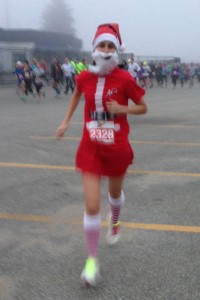
My workshop morning actually started out with the Annapolis 1/2 marathon where I got a personal best time of 1:45:08. And yes I ran as Santa. Not a bad way to start the day!

